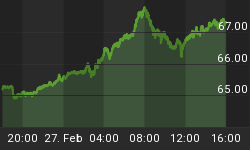July 28 would have been Ralph N. Elliott's 140th birthday, so it's a fitting time to post an excerpt from his essay, "The Basis of the Wave Principle." There's nothing like reading for yourself what the discoverer of the Wave Principle wrote about how it works. This essay is taken from the book, R.N. Elliott's Masterworks. It's the definitive collection that Robert Prechter collected and published in 1994.
The Basis of the Wave Principle
by R. N. Elliott
First published on October 1, 1940
Civilization rests upon change. This change is cyclical in origin and characteristics. A rhythmic series of extreme changes constitutes a cycle. When a cycle has been completed, another cycle is started. The rhythm of the new cycle will be the same as that of the previous cycle, although the extent and duration may vary. The cycle progresses in accordance with the natural law of movement.
The behavior of cycles has been studied extensively by puzzled economists, bankers and businessmen. In this connection, the conservative London Economist in a recent issue, commenting upon the results of a long study of trade cycles made by Sir William Beveridge, the noted British economist, said:
Sir William's researches have emphasized once again that the more the trade cycle is studied, the more it seems to follow the pressure of forces which, if they are not wholly beyond the reach of human control, have at least enough of the inexorable in their nature to make the policies of governments resemble the struggles of fish caught in the tides. Sir William pointed out that the trade cycle ignores politics; he might have added that it overrides economic policies.
The causes of these cyclical changes seem clearly to have their origin in the immutable natural law that governs all things, including the various moods of human behavior. Causes, therefore, tend to become relatively unimportant in the long term progress of the cycle. This fundamental law cannot be subverted or set aside by statutes or restrictions. Current news and political developments are of only incidental importance, soon forgotten; their presumed influence on market trends is not as weighty as is commonly believed.
This law of natural change is inevitable, and applies to the seasons and the movements of the tides and planets. It has truly been said that change is the only "immutable thing in life." Being a natural phenomenon, it necessarily governs all human activities, even the relatively static sciences of biology and botany. Even time and mathematics appear to be amenable to the application of this law of rhythm from the small unit of hours to the great intervals of decades, centuries and millennia. Measuring the behavior of cycles should therefore offer a reliable means of forecasting changes, regardless of the cause, and thus yield handsome profits.
In an independent study of the available data, extending over a period of many years, the writer has observed certain recurring behavior of change in movement. Apparently these changes follow a natural law that inevitably influences the mass. Finally there evolved certain principles, which were carefully tested back over a long period of years.
By 1934, I was able to resolve the various trends of changes in stock prices to a rhythmic series of component waves, which I called a "cycle." This cyclical rhythm has occurred regularly and repeatedly not only in the available records of the various stock exchanges, but also in commodities, industrial production, temperature, music, variation in color, electric output, population movements to and from cities, etc. In fact, it is manifest so widely, not only in human activities but also in the working of nature itself, that I have termed this discovery "The Wave Principle."
Understanding of this law enables the close student to forecast the terminations of cycles by means of the market itself. The Wave Principle is not a "market" system or theory. The forecasting principle involved goes far beyond the concept of any known formula....

Learn more about the Elliott Wave Principle and how applying it to your market analysis can improve your investing and trading. Take the entire online course -- The Elliott Wave Tutorial: 10 Lessons on the Wave Principle -- FREE! Click here to access the 10 Lessons
This article was syndicated by Elliott Wave International and was originally published under the headline Read About the Elliott Wave Principle in R.N. Elliott's Own Words on his Birthday. EWI is the world's largest market forecasting firm. Its staff of full-time analysts led by Chartered Market Technician Robert Prechter provides 24-hour-a-day market analysis to institutional and private investors around the world.















